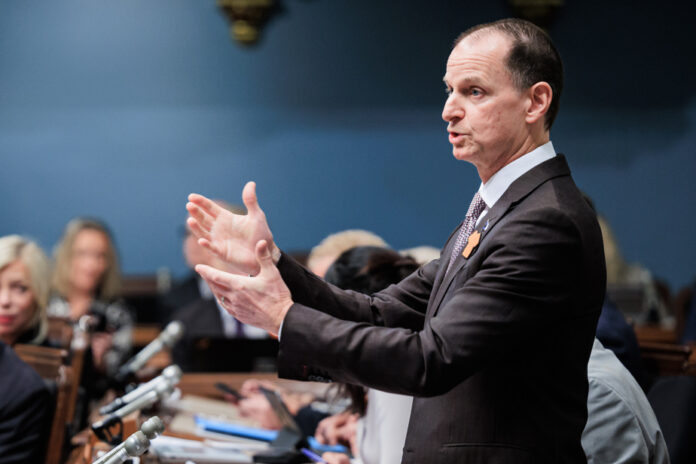(Quebec) Lower taxes on businesses and individuals, end public aid to “poorly performing” companies, adopt a law on “collective enrichment” and encourage workers to delay their retirement: several recommendations have been made. been made to the Minister of Finance by a group of experts to reduce the wealth gap between Quebec and Ontario. Eric Girard will analyze it “in the coming months”.
The Legault government requested the help of “eminent experts”, such as Pierre Fortin of UQAM, Luc Godbout of the University of Sherbrooke, Jimmy Jean of the Desjardins Movement and Stéfane Marion of the National Bank of Canada to find solutions to “close” the gap in living standards between Quebec and Ontario, a key focus of the Coalition Avenir Québec.
They submitted their recommendation to the minister in recent weeks. They were presented Tuesday in the economic and financial update of the Quebec government. “Some recommendations contradict each other. Some experts ask us to do more, others less. We will analyze this in the coming months,” said Finance Minister Eric Girard at a press conference.
He is particularly interested in the recommendations which suggest that he concentrate state economic aid in certain sectors since Quebec is a “small economy” and cannot “do everything”.
The observation drawn up by these experts is the following: the standard of living in Quebec is lower than elsewhere in Canada and in Ontario because Quebecers work less and for shorter hours than their neighbors, and private companies do not invest enough in research and development.
Several economists recommend tax cuts, while emphasizing that they should not be financed by deficits. They therefore make “zero-cost” proposals, such as increasing the QST and reducing income tax in an equivalent manner or simplifying the tax system by reducing the number and amount of different tax expenditures in order to reduce the income tax rate.
Minister Girard immediately ruled out the possibility of raising the QST to lower taxes.
The experts made several proposals to the Legault government. In particular, they believe that Quebec should:
The wealth gap between Quebec and Ontario has already started to decrease, going from 16.1% (2018) to 13.5% (2022), argues the CAQ government. He wants Quebec to reduce the gap to 10% in 2026, and to 0% in 2036.
However, that with the United States has widened significantly. It was 14.2% in 1981, then 44.3% in 2018, and 51.2% in 2022. “The gap with the United States has widened during this period, as the economy American has benefited from significant productivity gains,” notes the ministry.
To explain this situation, experts make several observations. Quebec workers have a “stronger employment presence in low-wage industries.” In addition, SMEs “form the basis of the economic fabric of the province” while large businesses are more productive.
Another factor: the shorter work week. “The average workweek length was 31.8 hours, less than Canada (32.7 hours) and the United States (34.5 hours). » “If the number of hours worked per week in Quebec were equivalent to those in Ontario in 2022, the standard of living in Quebec would be higher by approximately $1,450 per capita, a gain of approximately 3%,” notes the Ministry.
We should also encourage those aged 60 to 69 to participate more in the labor market. “If the employment rate of the population aged 60 to 69 in Quebec is that observed in Ontario in 2022, Quebec would have 76,500 workers,” notes the document. If this were the case, the standard of living of Quebecers would increase by $845, an increase of 1.7%.
Quebec emphasizes that it has already acted, in particular by making the contribution to the Régie des rentes du Québec optional from age 65, as of January 1, 2024, but experts believe that more must be done.
As for business investment, it must increase. In 2022, the value of investments per private sector worker reached $14,842 in Quebec, $17,000 in Ontario, and $31,443 in the United States. Another observation: an annual increase in business investments of 7 billion (15%) would have a positive effect on Quebec’s real GDP of around 27.5 billion annually in the long term. The Ministry of Finance, for its part, announces a renewal of the investment and innovation tax credit.















